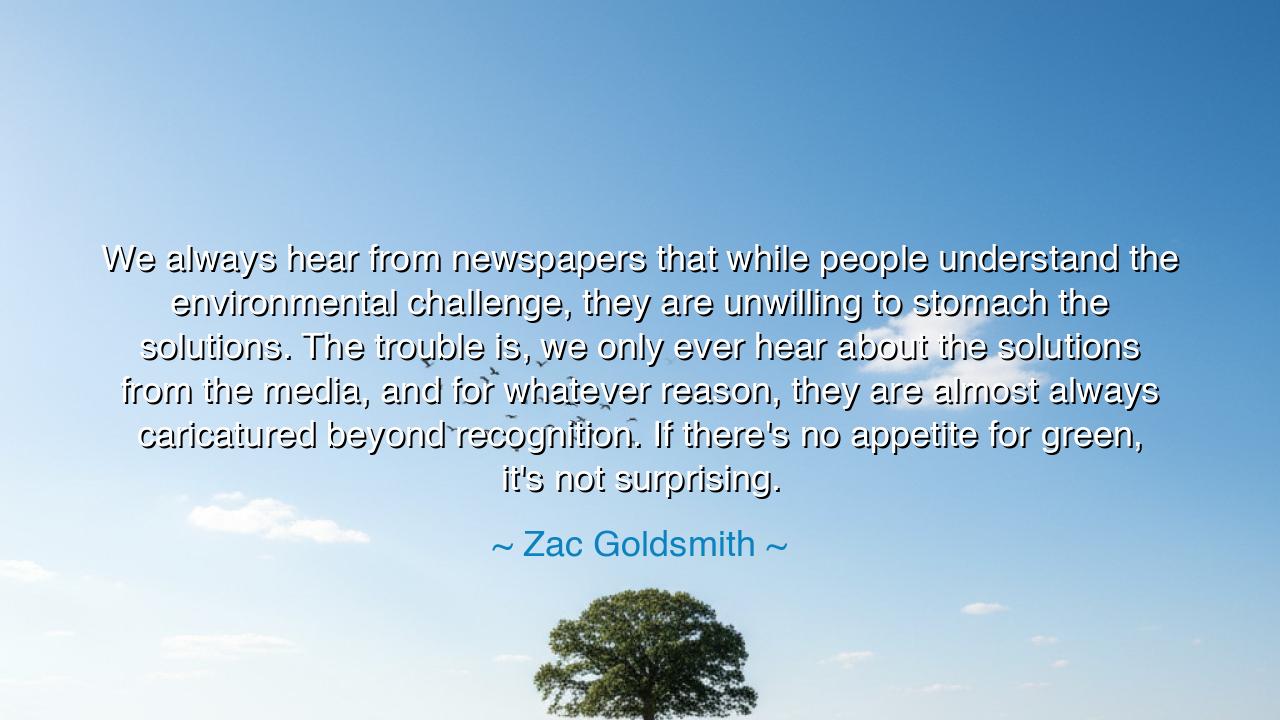
We always hear from newspapers that while people understand the
We always hear from newspapers that while people understand the environmental challenge, they are unwilling to stomach the solutions. The trouble is, we only ever hear about the solutions from the media, and for whatever reason, they are almost always caricatured beyond recognition. If there's no appetite for green, it's not surprising.






Hear, O seekers of truth, the words of Zac Goldsmith, who declared: “We always hear from newspapers that while people understand the environmental challenge, they are unwilling to stomach the solutions. The trouble is, we only ever hear about the solutions from the media, and for whatever reason, they are almost always caricatured beyond recognition. If there’s no appetite for green, it’s not surprising.” In this utterance lies a great revelation, that the fate of truth often hangs not upon its essence, but upon how it is told, shaped, and distorted in the arena of voices.
The meaning of these words is clear: people are not blind to the challenge of the earth’s suffering. They see the smoke that clouds the sky, the seas rising, the forests felled. Yet when they are told of remedies, they are too often presented in grotesque form, as burdensome, impossible, or absurd. The media, entrusted to carry truth, often twists it into mockery, presenting solutions as though they were chains rather than liberation. And thus the people, hearing only the distorted echo, turn away in fear or indifference.
The ancients too understood the danger of the distorted message. In the tale of Cassandra of Troy, she was gifted with foresight to see disaster, but cursed that her words would never be believed. Her warnings, though true, were dismissed, and Troy burned as a result. So too in our time, those who warn of ecological peril may find their message ridiculed, their solutions misrepresented. And the people, unable to discern truth from caricature, dismiss both, and the peril grows ever nearer.
Consider the real example of renewable energy. In its early days, it was mocked as weak, expensive, and impractical. Headlines scoffed at solar panels, wind turbines, and the vision of clean power, portraying them as toys for dreamers. Yet now, decades later, these very solutions power cities, employ millions, and stand as pillars of a new economy. If the people had only been given truth rather than caricature, progress could have come sooner, and suffering lessened. Goldsmith’s words call out this tragedy: that solutions misrepresented delay salvation.
The lesson is profound: the voice that shapes the story holds great power. If solutions to our environmental challenge are presented with clarity, hope, and honesty, the people will embrace them. But if they are wrapped in distortion, framed as sacrifice without reward, then apathy reigns. This is why the guardians of truth—journalists, teachers, leaders—carry a burden heavier than gold. For they shape not only perception but the very will of nations.
Yet the responsibility does not rest with leaders alone. Each person must learn to seek beyond headlines, to question what is presented, and to search for the true form of the solutions. Just as the wise farmer does not discard the seed because its shell is rough, so too must we look past the caricatures to the living truth within. To train one’s ear to discern truth is itself an act of heroism in an age of noise.
Therefore, O listener, let this teaching guide you: do not be swayed only by the voices of the media, but dig deeper, question, and learn. Share what you discover with clarity and without distortion, so that others may see solutions for what they are—pathways to renewal, not chains of burden. Support leaders who speak honestly, and resist those who mock or misrepresent. For the earth’s future depends not only on the creation of solutions but on their faithful telling.
And so, let Goldsmith’s words be a warning and a call. If there is no appetite for green, it is not the fault of the solutions themselves, but of the way they have been served. Let us, then, be the ones who prepare them rightly, presenting hope, not fear; opportunity, not caricature. In this way, the people may yet rise to meet the challenge, not with reluctance, but with courage and resolve.






AAdministratorAdministrator
Welcome, honored guests. Please leave a comment, we will respond soon